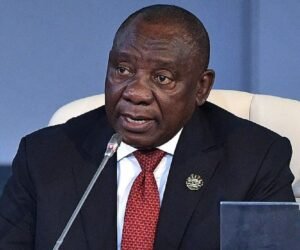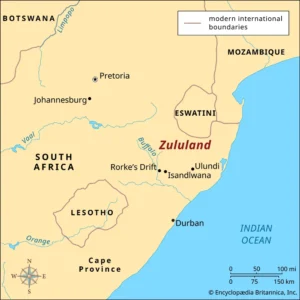Cyril Ramaphosa of the African National Congress was re-elected as president of South Africa on Friday during the first sitting of the 7th Parliament’s National Assembly.
The ANC, South Africa’s ruling party, announced in a post on X that Ramaphosa has been re-elected as president.
Honourable Matamela @CyrilRamaphosa has been re-elected as the President of the Republic of South Africa during the First Sitting of the National Assembly of the 7th Democratic Parliament tonight at Cape Town International Convention Centre
#ANCInParliament… pic.twitter.com/DsEV1pOmCy— African National Congress (@MYANC) June 14, 2024
Around 283 legislators supported Ramaphosa, whereas only 44 supported Malema’s nomination. Many feel that the South African president-elect’s moderate tastes finally prevailed over the ANC’s more leftwing factions. Surprisingly, the agreement was reached despite criticism that the DA favors the interests of South Africa’s white minority.

Mr Ramaphosa called the coalition deal a “new birth, a new era for our country” and said it was time for the parties to “overcome their differences and to work together”.
“That a number of parties that had opposed each other… have decided to work together to deliver this result has given a new birth, a new era to our country,” he said.
My Acceptance Statement during the First Sitting of the National Assembly of the 7th Parliament. pic.twitter.com/gmJ0LPylJf
— Cyril Ramaphosa 🇿🇦 (@CyrilRamaphosa) June 15, 2024
Following the formation of the alliance, parliamentarians were sworn in at a conference center in Cape Town, while the parliament building was being restored following a fire in 2022.
The two parties signed a “statement of intent” that included a pledge to provide “merit-based, nonpartisan, and professional civil service”. The ANC has previously been chastised for putting its supporters to public sector positions, a practice known as “cadre deployment” in South Africa, with many saying that it breeds corruption.
The ANC — the famed party of Nelson Mandela — had ruled South Africa with a comfortable majority since the end of the apartheid system of white minority rule in 1994.
The party’s support has been waning in recent years, however, with voters becoming increasingly disillusioned by persistently high levels of poverty, inequality and crime, rolling power cuts and corruption in party ranks.
The new national unity government includes the Inkatha Freedom Party, which won 17 seats, and has a largely ethnic Zulu base.

- Zulu land in map of South Africa
The newly formed populist Umkhonto we Sizwe (MK) party led by former president Jacob Zuma won 58 seats but has alleged the election was rigged and says it will boycott the new parliament. The Constitutional Court has dismissed the party’s case alleging fraud, saying it has no merit.

About Cyril Ramaphosa
- Cryil Ramaphosa political career as an anti-apartheid activist and trade union leader. Ramaphosa was elected secretary-general of the African National Congress (ANC) in 1991 and became an MP in South Africa’s first democratic election in 1994.
- Cyril Ramaphosa served Deputy President from 2014 to 2018, before becoming President.
- President Cyril Ramaphosa has acknowledged the urgent social challenges South Africa faces, such as unemployment, crime, poverty, and service delivery problems in municipalities.
- ANC leader, Cyril Ramaphosa expressed concern for the unemployed and impoverished, emphasizing the need for government measures to protect the dignity of all people while being mindful of resources
- Ramaphosa has also noted that despite progress, South Africa remains a highly unequal society with many households lacking basic services like electricity or clean water, and many families still going hungry.
- In 1991, he was elected ANC secretary-general under Nelson Mandela and became the ANC’s chief negotiator during the negotiations that ended apartheid.
About African National Congress
President Cyril Ramaphosa belongs to African National Congress (ANC), is a South African political party that belonged to the anti-apartheid movement. It was founded in 1912 and played a key role in leading South Africa to democracy. During the apartheid era, it was banned and many of its leaders were imprisoned or exiled.
South Africa’s form of Government
South Africa uses a mixed system of government, which blends elements of democratic presidentialism and parliamentary representation. The country’s president, who is both the head of state and government, is elected every five years through a direct popular vote.










